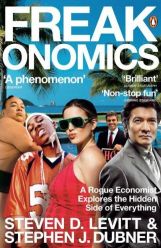Book review: 'Freakonomics' by Steven Levitt & Stephen Dubner
11 October 2006
 There are two themes running through 'Freakonomics'. The first is what a great bloke the co-author Steven Levitt is. Authors are expected to big themselves up on their book covers ('If Indiana Jones were an economist, he'd be Steven Levitt'), but it doesn't stop there. Words used to describe Levitt inside the book include 'the most brilliant young economist in America', someone who is 'so talented that [his work] doesn't need a unifying theme', 'a demigod, one of the most creative people in economics and maybe in all social science', 'a noetic butterfly no one has managed to pin down', and 'a master of the simple, clever solution'. This last one comes after six pages of introduction and two proper chapters, by which time it's too late to be pitching: we're either convinced he's worth reading because of his ideas, or we're not.
There are two themes running through 'Freakonomics'. The first is what a great bloke the co-author Steven Levitt is. Authors are expected to big themselves up on their book covers ('If Indiana Jones were an economist, he'd be Steven Levitt'), but it doesn't stop there. Words used to describe Levitt inside the book include 'the most brilliant young economist in America', someone who is 'so talented that [his work] doesn't need a unifying theme', 'a demigod, one of the most creative people in economics and maybe in all social science', 'a noetic butterfly no one has managed to pin down', and 'a master of the simple, clever solution'. This last one comes after six pages of introduction and two proper chapters, by which time it's too late to be pitching: we're either convinced he's worth reading because of his ideas, or we're not.And mostly, to be fair, we are. The second theme of the book is how the tools of economics and data processing can be used to test assumptions and explode myths about what motivates people. Along the way, Levitt answers questions such as why do so many drug dealers live with their mothers if dealing crack is supposed to be so lucrative? And do estate agents work in your best interests? He uses data to find teachers faking student exam marks and sumo wrestlers throwing a fight.
There are some surprising conclusions (although not about estate agents, needless to say). Prostitutes typically earn more than architects, he concludes, which is in part a reflection of the demand for their services: "Let's just say an architect is more likely to hire a prostitute than vice versa". Levitt demonstrates that US crime fell in the nineties mainly because of a pro-abortion law passed decades earlier, and that swimming pools pose a bigger threat to children than guns do.
Such ideas are fun to play with, but the book loses its way as it progresses. The concluding chapters are about what makes a perfect parent and what impact a baby's name might have on its life. Both get too bogged down in data to argue a convincing case.
Freakonomics has a lot of fascinating material and is recommended for anyone who enjoys a bit of a brain workout. Don't sweat the last two chapters, though. And don't write Levitt fan mail. It might go to his head.
Labels: book review, politics
